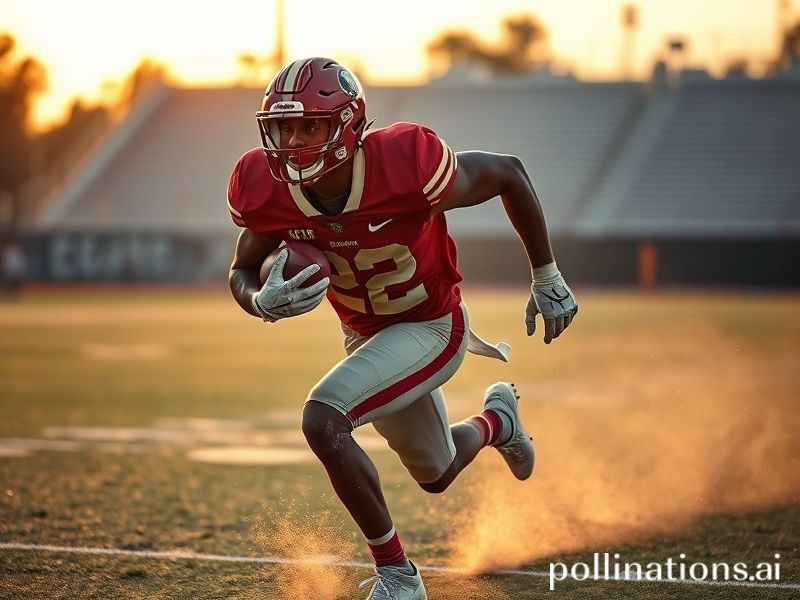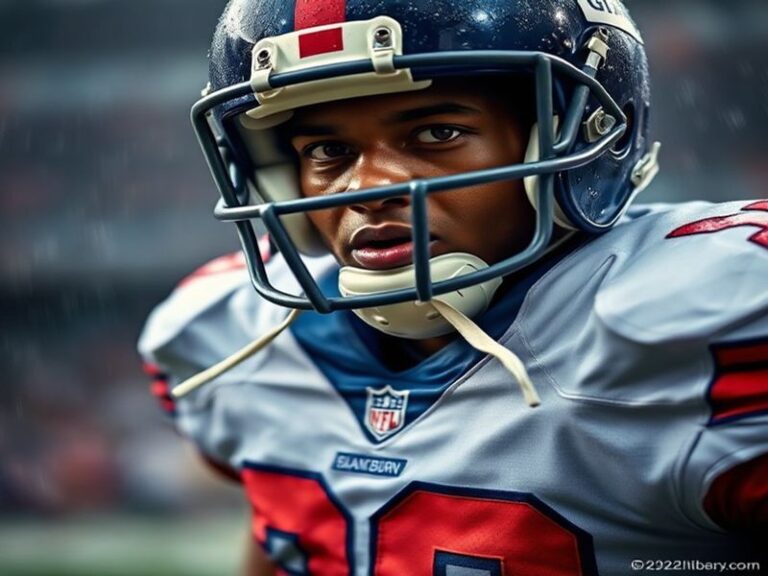Trey Benson: The Global Commodity in Pads Sprinting Through Our Late-Capitalist Playbook
Trey Benson and the Curious Case of the Global Running Back Industrial Complex
By Dave’s Locker International Desk
In a world where grain shortages, crypto meltdowns, and billionaires cosplaying rocket men dominate the headlines, the meteoric ascent of one Trey Benson—Florida State sophomore running back, 6-1, 223 lbs, reportedly capable of outrunning guilt—somehow warrants a dispatch from five time zones away. Why, you ask, should anyone in Lagos, Linz, or Laos care about a 21-year-old who spends his Saturdays turning linebackers into regrettable lifestyle choices? Because Benson is not merely an athlete; he is a data point in humanity’s ongoing experiment to sell hope by the yard, exportable in HD to every corner of the planet where Wi-Fi is stronger than the local currency.
Let’s zoom out. In Europe, football still means 22 men in shorts pretending to be hurt; in the United States, it means 22 men actually getting hurt while the rest of us pretend to care about amateurism. Benson sits at the nexus of this morality play. NFL scouts—those well-compensated augurs who read futures in ACL scans—have already circled his name on their laminated scrolls. Across the Pacific, Chinese streaming platforms have quietly added Florida State games to their “American Gladiator Karaoke” package, subtitling his breakaway TDs with Mandarin puns about capitalist velocity. Meanwhile, sports-data startups in Tel Aviv feed his GPS coordinates into AI models originally designed to optimize drone flight paths, proving once again that every human endeavor eventually becomes a side hustle for the military-industrial complex.
The kid himself is, by all accounts, polite, soft-spoken, and still surprised that his Instagram following now exceeds the population of Iceland. He hails from Mississippi, a state that exports catfish, heartbreak, and—if the mock drafts are accurate—first-round draft picks. His backstory is catnip to the content mill: raised by a single mom, overcame injuries, once worked at an amusement park where he operated a ride called “The Gravitron,” a name that now doubles as an ironic metaphor for what happens when 300-pound defensive ends attempt to tackle him. The global media apparatus, ever hungry for redemption arcs it can monetize, has already translated this into twelve languages, including Korean, where the word for “tackle” also means “existential dread.”
Benson’s rise also coincides with a moment when the entire planet is renegotiating the value of human bodies. Qatar just finished hosting a World Cup built by migrant labor at 50°C; the NFL’s next expansion franchise may well be located in London, where fans still think a “first down” is an artisanal pub. Against this backdrop, Benson’s 4.3-second 40-yard dash becomes a universal currency, a hedge against inflation more reliable than Bitcoin and less volatile than the British Prime Minister. Nike has already shot a moody teaser ad in which he runs through a post-apocalyptic cityscape that looks suspiciously like downtown Detroit, soundtracked by a Swedish DJ who goes by the stage name “Existential Funk.”
Of course, there’s the darker ledger. For every yard Benson gains, some anonymous cornerback loses a sliver of cartilage that will haunt him during his future career selling insurance. The NCAA—an organization that makes FIFA look like a Montessori collective—continues to insist that the “student-athlete” is a purely amateur entity, a claim now roughly as credible as North Korean census data. Meanwhile, online sportsbooks from Malta to Manila offer micro-bets on whether Benson will eclipse 100 yards before the third quarter, because nothing says “amateur sport” like a 19-year-old in Manila mortgaging his phone bill on a prop bet.
Still, we watch. Not because we particularly care about Florida State’s offensive line—though to be fair, they are doing remarkable work for unpaid interns—but because Benson’s trajectory is a Rorschach test for our own aspirations. Beijing sees soft-power potential; Silicon Valley sees wearable tech; your cousin in Calgary sees a fantasy-league payday. And somewhere in Tallahassee, a young man keeps running, blissfully unaware that every yard he gains is simultaneously a triumph, a commodity, and a tiny indictment of the elaborate theater we’ve built around 18-to-22-year-olds who can, if only for four seconds, outrun the gravitational pull of late capitalism.
In the end, Trey Benson isn’t just running past linebackers. He’s sprinting across a planet that’s still trying to figure out what to do with its excess testosterone, bandwidth, and existential dread. We’ll keep broadcasting, betting, and branding until the knees give out or the ratings do—whichever comes first. Either way, the highlight reels will be available for download in 4K, region-locked subtitles included, because even in a fractured world, we can still agree on one thing: speed sells.







